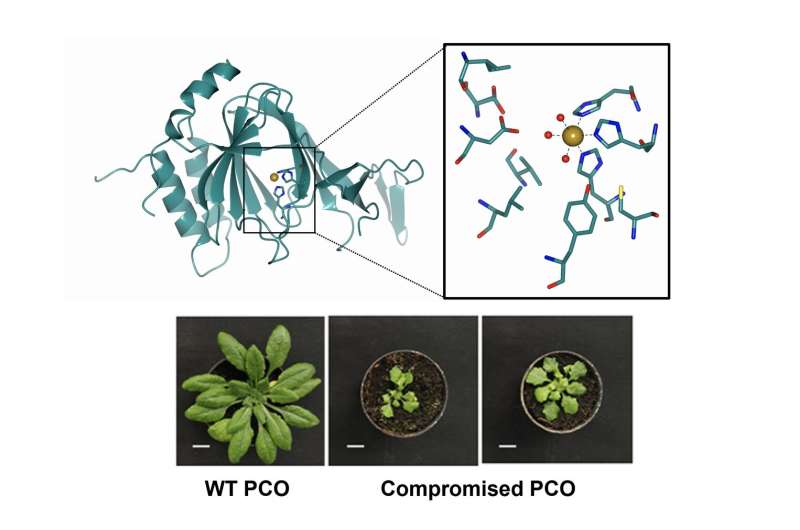Crystal structure of PCO4, highlighting key amino acid residues, the importance of which were verified in the model plant Arabidopsis. (WT = wild type, ie: plant in wild). Credit: University of Oxford/PNAS
Enzymes that control a plant's response to lower oxygen levels could be manipulated to make vital crops resistant to the impacts of flooding triggered by climate change, new research shows.
Co-author Dr. Mark White in the School of Chemistry at the University of Sydney said: "Climate change is a major global issue, not least for its impact on food security. We hope these findings can help produce flood-tolerant crops to help mitigate the devasting social and economic impact of extreme weather events on food production."
The research, largely done at the University of Oxford, is published today in the Proceedings of the National Academy of Sciences of the United States of America.
Climate change has increased the number and intensity of global flooding events, threatening food security through significant crop loss. Plants, including staple crops such as rice, wheat and barley, can survive temporary periods of flooding by activating energy pathways that don't rely on air in response to the low oxygen conditions in water.
These responses are controlled by oxygen-sensing enzymes called the Plant Cysteine Oxidases (PCOs), which use oxygen to regulate the stability of proteins that control gene activity.
The research describes the molecular structures of the PCOs for the first time, identifying chemical features that are required for enzyme activity.
"The results provide a platform for future efforts to manipulate the enzyme function in an attempt to create flood-resistant crops that can mitigate the impact of extreme weather events," Dr. White said.
More information: Mark D. White el al., "Structures of Arabidopsis thaliana oxygen-sensing plant cysteine oxidases 4 and 5 enable targeted manipulation of their activity," PNAS (2020). www.pnas.org/cgi/doi/10.1073/pnas.2000206117
Journal information: Proceedings of the National Academy of Sciences
Provided by University of Sydney























